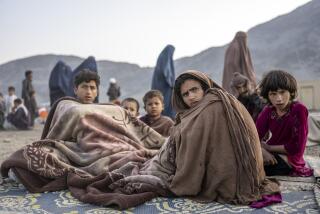Pakistan Pledges Its Cooperation in Fighting Terrorists, Report Says
ISLAMABAD, Pakistan — The United States has asked for Pakistan’s “full and practical cooperation” in pursuing those suspected of the terrorist assaults on the World Trade Center and the Pentagon, a senior Pakistani official said Wednesday.
The official, who declined to be identified, said the request was conveyed by the U.S. Embassy to the Foreign Ministry during the course of the day and was under discussion. The request is being interpreted by officials here to include the use of Pakistan’s airspace and territory if necessary.
In Washington, Secretary of State Colin L. Powell said the Bush administration is waiting to see if Pakistan will be helpful in “generating information” and if it will assist if the U.S. finds a basis to act upon that information.
Early today, Pakistan’s APP news service reported that President Pervez Musharraf had promised the U.S. full cooperation. The promise reportedly extended to helping identify the culprits in Tuesday’s attack but left open the question of assistance in exacting revenge.
“Pakistan has been extending cooperation to international efforts to combat terrorism in the past and will continue to do so,” Musharraf was quoted as saying.
Recently arrived U.S. Ambassador Wendy Chamberlain is scheduled to meet here today with Musharraf.
Pakistani support would be crucial if the Bush administration decided to attack neighboring Afghanistan or the man who appears to be a prime suspect in Tuesday’s terrorist attacks, Saudi-born militant Osama bin Laden. Afghanistan provides shelter to Bin Laden, who faces a U.S. indictment in the 1998 terrorist bombings of U.S. embassies in Kenya and Tanzania.
Pakistani government officials reportedly are working on the assumption that they must make their decision quickly. But even in the current political caldron, any concrete measure of support for U.S. retaliation would be politically difficult for the country’s military leadership.
Resentment against the U.S. still lingers here for a 1998 cruise missile attack against targets in eastern Afghanistan believed to be Bin Laden’s terrorist training camps. The missiles, launched by U.S. forces in reprisal for the Africa bombings, traveled through Pakistan’s airspace without permission.
Many Pakistanis, although clearly stunned by the enormity of Tuesday’s terrorist attacks in New York and Washington, say they would find it difficult to have their government cooperate actively in a new military strike against Bin Laden.
“There is no one in Pakistan not willing to condemn the event, which is a terrible tragedy, but the United States should not react this way,” said Syed Munnawar Hasan, a spokesman for the country’s largest religious-based political party, the Jamaat-e-Islami. “From moment one, they have named only Osama bin Laden and other Muslims” as suspects.
He said public sentiments would make it difficult for Musharraf’s government to aid a U.S. reprisal without strong evidence of Bin Laden’s complicity in the attacks.
“Even the government is not going to concede unless you have proof, unless you have conclusions, and then take the people into confidence,” he said.
Syed Ali, vice chairman of the Karachi-based chemical company Dynea, said it would be difficult to punish those responsible by launching a military strike against them.
“You hear they want to retaliate against Afghanistan, but what can you do to them?” he added. “They are living for the next world, not this one.”
He also raised a commonly heard grievance in the Islamic world these days: that the U.S. does not take seriously the injustice Muslims believe they face.
Despite such sentiments, Musharraf used exceptionally strong language Wednesday to condemn the attacks on the U.S. for the second day in a row. In a statement released to the media, he denounced the action as “despicable and devastating.”
“As a peace-loving nation, Pakistan joins the world community in strongly condemning these brutal acts and the consequent loss of precious lives,” Musharraf said. “It is a threat to humanity and to the human civilization. Pakistan condemns all acts of terrorism anywhere in the world and shares the sorrow and grief of the people of the U.S.”
Pakistan, the United Arab Emirates and Saudi Arabia are the only nations that recognize the Taliban, the Islamic fundamentalist group that rules 95% of Afghanistan.
In the mid-1990s, Pakistan initially embraced the Taliban movement as a large and powerful force, but has gradually become disillusioned with it.
It has been unable to impose peace throughout the country and has embarrassed Pakistan through many of its hard-line actions.
*
Times staff writer Robin Wright in Washington contributed to this report.
More to Read
Sign up for Essential California
The most important California stories and recommendations in your inbox every morning.
You may occasionally receive promotional content from the Los Angeles Times.










